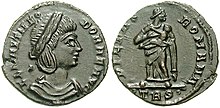Flavia Maximiana Theodora

Flavia Maximiana Theodora was a late ancient Roman empress. As the wife of the emperor Constantius Chlorus , with whom she had six children, she was an important member of the Constantinian dynasty he founded .
Theodora's parentage is unclear. Research mostly assumes that Theodora was the daughter of Eutropia , the wife of Emperor Maximian . However, she came from the first marriage of Eutropia with a Syrian , probably Afranius Hannibalianus , the consul of 292, and was therefore only Maximian's step-daughter. According to this version, she should not have borne the nickname Maximiana from birth, but only adopted it after Maximian was appointed co-regent of Emperor Diocletian in 286. Timothy D. Barneshowever, considers the sources in which Theodora is referred to as Maximian's stepdaughter to be less credible than those in which Theodora appears as his biological daughter. Barnes therefore considers Theodora to be the daughter of Maximian and a woman who is not known any further, perhaps a daughter of Afranius Hannibalianus, with whom he was previously married.
In 293 Diocletian created a new form of division of power with the appointment of Constantius I and Galerius as co- and sub-emperors ( Caesares ) : the tetrarchy . In order to strengthen the cohesion of the now four emperors, Maximian adopted his under-emperor Constantius. Even if later sources indicate that he also married his stepdaughter Theodora on this occasion, Constantius and Theodora were married in 289, as emerges from a panegyric held on April 21 of that year at Maximian's court. Constantius had to give up his previous partner Helena , the mother of Constantine , for this new connection. The marriage resulted in six children: the three sons Julius Constantius , Flavius Dalmatius and Flavius Hannibalianus and the daughters Constantia , Anastasia and Eutropia .
There are no indications of Theodora's future life, especially her fate during the reign of her stepson Constantine, who had been emperor since 306. Perhaps she died after the birth of her children, perhaps the missing sources can also be explained by the fact that Constantine kept his stepmother away from court and from power after he came to power. In any case, her sons had to retire to the Gallic town of Tolosa , where Theodora might also be staying. In general, it can be stated that Theodora remained in the background and - like the other women of the tetrarchy - did not appear politically.
literature
- Wilhelm Enßlin : Theodora 2). In: Paulys Realencyclopadie der classischen Antiquity Science (RE). Volume VA, 2, Stuttgart 1934, column 1773 f.
- Arnold Hugh Martin Jones , John Robert Martindale, John Morris : Theodora 1. In: The Prosopography of the Later Roman Empire (PLRE). Volume 1, Cambridge University Press, Cambridge 1971, ISBN 0-521-07233-6 , p. 895.
- Adolf Lippold : Theodora 1. In: The Little Pauly (KlP). Volume 5, Stuttgart 1975, Col. 688.
Web links
- Michael DiMaio, Jr .: Short biography (English) at De Imperatoribus Romanis (with references).
Remarks
- ^ So Anonymus Valesianus (Origo Constantini) 4.12.
- ↑ This could be concluded from the fact that one of her sons also bore the name Hannibalianus, cf. e.g. PLRE I, p. 895.
- ↑ So the description in Otto Seeck , Constantius 1) , in: RE IV, 1 (1901), Sp. 1040-1043, here Sp. 1041. Numerous historians have followed, such as Enßlin, in: RE VA, 2, Sp 1774; PLRE I, p. 895.
- ↑ Aurelius Victor , Liber de Caesaribus 39.25, Eutropius 9.22; Hieronymus , Chronicon 225g; Epitome de Caesaribus 39.2; 40.12.
- ↑ Origo Constantini 2; Philostorgios 2.16.
- ^ Barnes, The New Empire of Diocletian and Constantine , Cambridge / Massachusetts - London 1982, pp. 33f.
- ↑ About Eutropius 9.22.1; others collected from Enßlin, in: RE VA, 2, Sp. 1774.
- ↑ Panegyrici latini 10 (2), 11.4. Seeck, in: RE IV, 1, Sp. 1041; Barnes, New Empire , pp. 125f.
- ^ This is what Enßlin suspects, in: RE VA, 2, Sp. 1774.
- ↑ Ausonius , Commemoratio professorum Burdigalensium [16] 17.11 f. notes the quasi-exile of the sons. Enßlin, in: RE VA, 2, Sp. 1774, connects this with Theodora.
- ↑ In addition Manfred Clauss , Die Frauen der Diokletianisch-Constantinischen Zeit , in: Hildegard Temporini-Gräfin Vitzthum (Ed.), Die Kaiserinnen Roms. From Livia to Theodora , CH Beck, Munich 2002, pp. 340–369, here p. 343.
| personal data | |
|---|---|
| SURNAME | Theodora, Flavia Maximiana |
| ALTERNATIVE NAMES | Theodora |
| BRIEF DESCRIPTION | late antique Roman empress |
| DATE OF BIRTH | before 289 |
| DATE OF DEATH | 4th century |